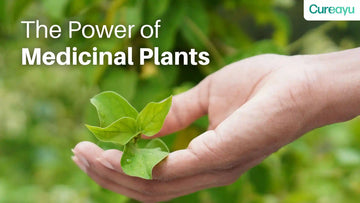In an era where synthetic medicines dominate the pharmaceutical industry, medicinal plants hold a timeless appeal for their natural and holistic healing properties. These herbal wonders have been used for centuries in traditional medicine systems like Ayurveda, Traditional Chinese Medicine, and Native American remedies. Today, as more people seek sustainable and natural health solutions, medicinal plants are regaining their rightful place as powerful allies in promoting well-being.
Herbal plants provide a treasure trove of benefits, addressing everything from minor ailments to chronic diseases. Their affordability, minimal side effects, and eco-friendliness make them a preferred choice for many. But what exactly are medicinal plants, and how can they be used in daily life? Let’s dive deep into understanding these botanical marvels.
Also Read: The Healing Power of Nature: Exploring Medicinal Plants and Their Uses
What are Medicinal Plants?
Medicinal plants are those that contain bioactive compounds capable of preventing or curing diseases. These plants, rich in vitamins, antioxidants, and phytochemicals, have been studied extensively for their therapeutic properties. Unlike synthetic drugs, herbal plants work harmoniously with the body, addressing not just the symptoms but often the root causes of health issues.
In Ayurvedic and herbal medicine, medicinal plants are categorized based on their properties such as anti-inflammatory, antiseptic, diuretic, or adaptogenic. They can be consumed as teas, tinctures, powders, or applied externally in the form of oils, pastes, or compresses.
Medicinal Plants Name
- Neem: Known for its antiseptic and antibacterial properties, Neem is widely used for skin and oral health.
- Tulsi (Holy Basil): Revered for its immunity-boosting and stress-relieving benefits.
- Ashwagandha (Indian Ginseng): A powerful adaptogen that helps combat stress and enhances energy levels.
- Amla (Indian Gooseberry): Packed with Vitamin C, it supports digestion, immunity, and skin health.
- Turmeric: Renowned for its anti-inflammatory and antioxidant properties, aiding in wound healing and chronic disease management.
- Ginger: Effective for improving digestion and alleviating nausea and cold symptoms.
- Garlic: Known for its cardiovascular benefits and immune-boosting properties.
- Aloe Vera: A natural moisturizer, it soothes skin and aids in digestion.
- Shatavari: Promotes hormonal balance and supports reproductive health.
- Brahmi: Enhances memory, focus, and overall brain health.
- Guduchi (Giloy): Boosts immunity and helps manage chronic fever and respiratory ailments.
- Mulethi (Licorice): Soothes sore throats and supports respiratory and digestive health.
- Arjuna: Strengthens heart health and helps manage blood pressure.
- Kalmegh: Known for its liver-protective and anti-inflammatory properties.
Also Read: The Top 10 Vegan Protein Sources
Medicinal Plants and Their Uses
The uses of medicinal plants span a wide range of applications—from boosting immunity to alleviating stress, from enhancing skin health to managing chronic diseases like diabetes and arthritis. These plants are integral to holistic wellness, targeting physical, mental, and emotional health.
For instance, Neem is renowned for its antiseptic and antifungal properties, making it a go-to remedy for skin conditions like acne and eczema. Tulsi, often called the "queen of herbs," strengthens the immune system, supports respiratory health, and combats stress. On the other hand, Amla is a powerhouse of Vitamin C, offering benefits like enhanced digestion, improved eyesight, and glowing skin.
Medicinal Plant Chart
|
Ayurvedic Name |
Botanical Name |
Uses |
|
Neem |
Azadirachta indica |
Skin health, detoxification, immunity boost |
|
Tulsi |
Ocimum sanctum |
Respiratory health, stress relief |
|
Ashwagandha |
Withania somnifera |
Stress management, energy enhancement |
|
Amla |
Emblica officinalis |
Digestion, skin health, immune support |
|
Turmeric |
Curcuma longa |
Anti-inflammatory, wound healing |
|
Aloe Vera |
Aloe barbadensis miller |
Skin hydration, digestion |
|
Ginger |
Zingiber officinale |
Digestion, nausea relief |
|
Garlic |
Allium sativum |
Heart health, cholesterol management |
|
Brahmi |
Bacopa monnieri |
Memory enhancement, anxiety relief |
|
Guduchi |
Tinospora cordifolia |
Immunity, chronic fever |
|
Mulethi |
Glycyrrhiza glabra |
Sore throat, respiratory health |
|
Arjuna |
Terminalia arjuna |
Heart health, blood pressure regulation |
|
Gokhru |
Tribulus terrestris |
Kidney health, strength enhancement |
|
Gotu Kola |
Centella asiatica |
Cognitive function, wound healing |
|
Green Tea |
Camellia sinensis |
Antioxidant, weight management |
|
Guggul |
Commiphora mukul |
Joint health, cholesterol reduction |
|
Pashanbhed |
Bergenia ligulata |
Kidney stone prevention, urinary health |
|
Shankhpushpi |
Convolvulus pluricaulis |
Cognitive enhancement, stress relief |
|
Shatavari |
Asparagus racemosus |
Hormonal balance, reproductive health |
|
Shilajeet |
Asphaltum |
Stamina, vitality, anti-aging |
Benefits and Importance of Using Ayurvedic Plants
Ayurvedic plants have a profound impact on human health. Their benefits go beyond curing diseases, offering preventive care and promoting overall wellness. Here are some compelling reasons to incorporate these herbal plants into your life:
- Natural Healing: Medicinal plants provide a natural alternative to synthetic drugs, minimizing the risk of side effects.
- Explanation: Unlike chemical-based medicines, herbal remedies work in harmony with the body, addressing the root cause of ailments.
- Cost-Effective: Herbal plants are often more affordable than pharmaceutical drugs.
- Explanation: Many medicinal plants can be grown at home, cutting down medical expenses significantly.
- Environmentally Friendly: Using medicinal plants contributes to sustainable living.
- Explanation: These plants are biodegradable and do not pollute the environment like synthetic drug residues.
- Cultural Relevance: Medicinal plants are deeply rooted in cultural and spiritual traditions.
- Explanation: Incorporating these plants connects us to ancient wisdom and holistic healing practices.
- Versatility: One herbal plant often has multiple uses, making them a versatile choice for health care.
- Explanation: For instance, turmeric not only treats wounds but also supports digestion and boosts immunity.
Also Read: Discovering the Bountiful Plant-Based Diet Benefits: Health, Environment, and Beyond
Conclusion
Medicinal plants are a gift of nature, offering a sustainable, holistic, and effective approach to health and wellness. Their versatility, accessibility, and profound healing properties make them indispensable in modern times, especially as the world seeks greener and more natural alternatives. By incorporating herbal plants into our daily routines, we not only promote personal health but also contribute to environmental conservation and cultural preservation.
As the saying goes, "Nature heals, and so do her gifts." Embracing medicinal plants is not just about treating illnesses; it’s about adopting a lifestyle that values balance, harmony, and holistic well-being. So, take a step toward a healthier future by integrating these botanical wonders into your life—because the power to heal lies in your hands and in nature's backyard.








